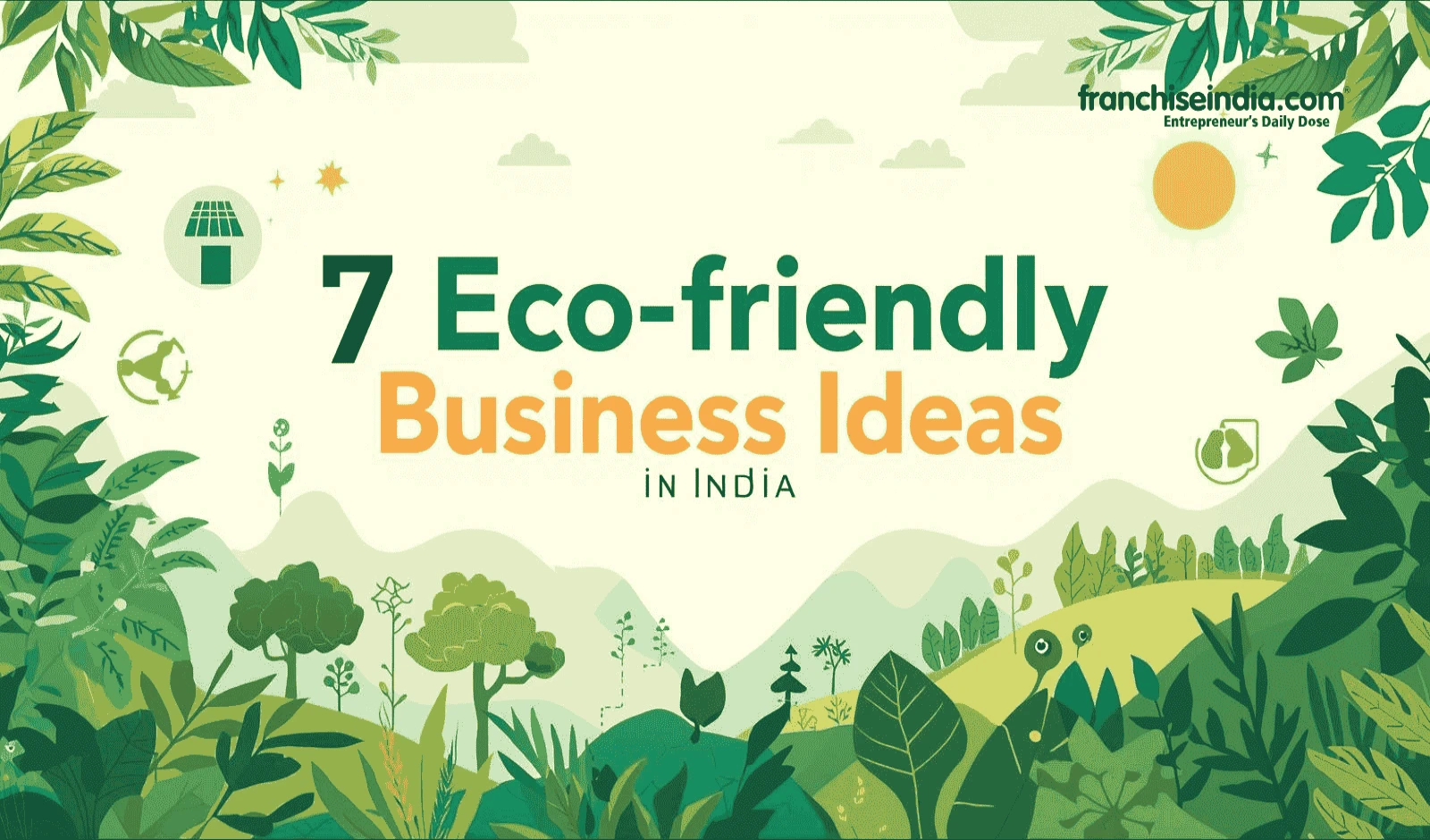
India is on the verge of a huge environmental and economic revolution. A truly eco-friendly business, or sustainable business in India, goes beyond mere compliance. Sustainability is now a requirement rather than merely a trendy term. Consumers, particularly in urban and semi-urban areas, are increasingly prioritising products and services that correspond with sustainable ideals, and they are prepared to pay a premium for verified eco-friendly company ideas in India. It is wise to establish a prosperous and ecologically conscious business. This comprehensive guide will cover everything you should know before starting a business.
Also read:
Eco-friendly goods and services are in high demand. Customers are more knowledgeable and prepared to spend more on brands that share their beliefs. Governments everywhere, including India, are putting laws into place and providing rewards to encourage environmentally friendly projects.
Due to this combination of circumstances, 2025 is a good year to start a sustainable business. Here are the 7 eco-friendly businesses you can start:
1. Biodegradable Tableware and Disposables
The war against plastic waste is going on and is the biggest driver of innovation and market demand. Major platforms like Flipkart and Amazon are investing heavily in eco-friendly packaging materials to meet both corporate sustainability goals and regulatory mandates.Focusing on the food service industry offers a high-volume, relatively low-capital entry point.
| Material | Key Advantage | Target Market | Startup Investment |
|---|---|---|---|
| Sugarcane Bagasse | Durable, water-resistant, widely available raw material from sugar mills. | Restaurants, caterers, and large corporate events. | ₹10 Lakhs – ₹15 Lakhs (Machinery, certifications) |
| Bamboo/Palm Leaf | Premium, artisanal feel requires simple moulding and drying processes. | High-end hotels, wedding planners, eco-retailers. | ₹5 Lakhs – ₹8 Lakhs (Sourcing, basic equipment) |
| Starch-Based Bioplastics | Suitable for manufacturing biodegradable bags and films (requires specialised extruders). | Retail chains and FMCG companies for secondary packaging. | Higher initial investment but scalable. |
How to Start
Firstly, obtain the necessary certifications, particularly CPCB (Central Pollution Control Board) certification, before manufacturing. Also apply for the MSE-SPICE Scheme for potential capital subsidies on machinery costs. Non-certified products face stiff penalties. You can start by taking land on lease and sourcing certified raw material suppliers.
Also read:
2. Urban Organic Farming and Hydroponics Services
India’s urban centres are seeking chemical-free, natural, fresh produce and efficient, water-saving agriculture methods.
Business Idea A: Rooftop/Balcony Vegetable Consulting
This model is high-margin and service-based. They offer end-to-end consulting, design, installation and monthly maintenance for setting them up. Revenue: Earn through a one-time setup fee and recurring maintenance contracts.
Business Idea B: Commercial Hydroponic Farms
Hydroponics are the plants that grow without soil using water. They use less water than traditional farming.
| Component | Estimated Investment (INR) | Details |
|---|---|---|
| Consulting Business Setup | ₹50,000 – ₹1 Lakhs | Marketing, tools, website, and initial nursery stock for urban kits. |
| Hydroponic Structure & Racks | ₹3 Lakhs – ₹6 Lakhs | Nutrient Film Technique (NFT) or Deep Water Culture (DWC) systems. |
| Dosing/Irrigation Systems | ₹1 Lakhs – ₹3 Lakhs | Pumps, nutrient mixers, and pH controllers. |
| Working Capital & Lights | ₹1 Lakhs – ₹6 Lakhs | LED grow lights, nutrients, and initial seed costs. |
| Total Estimated Investment | ₹5 Lakhs – ₹15 Lakhs | For a small, controlled-environment commercial setup. |
How to Start
For starting a hydroponic farm, you need to get short courses on how to manage them and the nutrient dosage to avoid initial failures. Acquire land on lease or an unused warehouse space or large rooftop. Instead of focusing on all, focus on high-value, fast-growing crops that serve a premium price. Secure supply contracts with high-end restaurants, five-star hotels, or specialty organic stores before your first major harvest.
3. Sustainable Fashion & Upcycled Textiles

The fashion industry is consistently polluting. There is a huge chance to implement circularity through upcycling business models in India, a significant centre for textile production. Consumers want products that are ethically sourced and unique goods.You can source textile waste, deadstock fabrics, and pre-used garments to transform them into high-value, marketable accessories.
| Component | Estimated Investment (INR) | Details |
|---|---|---|
| Sourcing & Inventory | ₹50,000 – ₹1.5 Lakhs | Bulk purchase of textile waste, denim scraps, or deadstock fabric from factories/wholesalers. |
| Equipment | ₹1 Lakhs – ₹3 Lakhs | Industrial sewing machines, overlockers, and specialized cutting tools. |
| Design & Artisans | ₹50,000 – ₹2.5 Lakhs | Initial design and payment to local artisans skilled in patchwork/stitching. |
| Online Store Setup | ₹20,000 – ₹50,000 | E-commerce platform registration and marketing collateral. |
| Total Estimated Investment | ₹2 Lakhs – ₹7 Lakhs | Ideal for a boutique brand run by a small team or family unit. |
How to Start
You can start by establishing long-term contracts with garment factories and tailoring units. You can develop a distinctive product line. Market your business by using photos and text to explain how textile waste was saved and transformed. Set your item’s price as unique and ethical goods, not as cheap recycled products.
Also read:
4. Green Consulting and Compliance Services
India's sustainability push has created a complex web of environmental compliance, certifications, and subsidies. Many small and medium enterprises (SMEs) lack the internal expertise to navigate this.You can establish a consultancy that specializes in helping MSMEs transition to greener technologies.
| Component | Estimated Investment (INR) | Details |
|---|---|---|
| Professional Training | ₹30,000 – ₹50,000 | Courses in ISO 14001, energy auditing, and MSME scheme rules. |
| Registration & Udyam | ₹10,000 – ₹20,000 | Business registration, GST, and Udyam certification fees. |
| Marketing & Digital Presence | ₹10,000 – ₹50,000 | Professional website, brochure design, and networking costs. |
| Total Estimated Investment | ₹50,000 – ₹2 Lakhs | A low-capital entry point focused entirely on intellectual property and networks. |
How to Start
Start by gaining in-depth, practical knowledge of MSE-GIFT and MSE-SPICE to advise on capital subsidies. And register your consultancy on the Udyam portal to access MSME benefits. You can build relationships with local industrial associations and financial institutions that participate in these schemes.
5. E-Waste Management and Refurbishment Hubs
The rapid growth of the digital economy has made India one of the largest producers of electronic waste (e-waste) globally. The need for formal, authorized recycling and refurbishment is critical.You can focus on the profitable segments of refurbishment while ensuring the disposal of non-reusable parts.
| Component | Estimated Investment (INR) | Details |
|---|---|---|
| CPCB/State PCB Authorization | ₹3 Lakhs – ₹6 Lakhs | Mandatory fees and compliance costs for obtaining official authorization as a collector/dismantler. |
| Secure Facility & Tools | ₹7 Lakhs – ₹15 Lakhs | Secure warehousing, specialized refurbishment equipment, and data destruction tools. |
| Compliance & Insurance | ₹3 Lakhs – ₹5 Lakhs | Environmental insurance and initial compliance infrastructure. |
| Total Estimated Investment | ₹15 Lakhs – ₹40 Lakhs | Required investment for legal entry into this regulated sector. |
How to Start
The first step is to secure the authorisation from the Central Pollution Control Board (CPCB) or the State Pollution Control Board (PCB). This operation is non-negotiable. You should focus on B2B and the highest returns come from repairing and reselling functional electronics. Then you can outsource the final, complex material recovery to a large authorised recycler, this will maintain compliance.
Also read:
6. Bio-Fertilizers and Organic Input Production
.png)
As millions of hectares of Indian farmland move towards organic certification, the demand for safe, natural alternatives to chemical inputs is accelerating. You can use local organic waste to create high-value agricultural inputs.
| Component | Estimated Investment (INR) | Details |
|---|---|---|
| Land/Shed Development | ₹50,000 – ₹2,00,000 | Basic infrastructure: constructing composting beds/tanks, simple shed covering. |
| Earthworm Stock | ₹20,000 – ₹50,000 | Purchase of high-quality earthworm breeding stock (Eisenia fetida is common). |
| Machinery | ₹20,000 – ₹1,00,000 | Sieving/screening equipment and basic processing tools. |
| Working Capital | ₹10,000 – ₹50,000 | Transportation of raw materials (cow dung, crop residue) and bagging. |
| Total Estimated Investment | ₹1 Lakh – ₹5 Lakhs | A genuine low-investment opportunity requiring management effort over capital. |
How to Start
Secure and establish free or low-cost supply agreements with local dairies or farmers. You should choose a well-drained, shaded area for the composting beds. Provide proper moisture and temperature control; this is crucial for earthworm health. After all this, test your product quality regularly to ensure high nutrient content.You can target local nurseries, smallholder organic farmers, and urban gardening communities for higher margins.
7. Sustainable Tourism and Homestays (Ecotourism)
India’s vast and diverse landscapes are perfect for this model. It focuses on responsible travel to natural areas while conserving the environment.You can build a network of small, community-integrated homestays in ecologically sensitive areas that practise true sustainability.
| Component | Estimated Investment (INR) | Details |
|---|---|---|
| Renovation/Construction | ₹5,00,000 – ₹12,00,000 | Using local, sustainable materials (bamboo, mud, stone) to reduce environmental footprint. |
| Utilities & Infrastructure | ₹3,00,000 – ₹6,00,000 | Solar water heating, solar power backup, rainwater harvesting, and waste treatment systems. |
| Permits & Registration | ₹1,00,000 – ₹2,00,000 | State Tourism Board accreditation and necessary local permits. |
| Staff Training & Marketing | ₹1,00,000 – ₹2,00,000 | Training local staff and setting up the booking platform. |
| Total Estimated Investment | ₹10 Lakhs – ₹20 Lakhs | Entry point for a high-quality, zero-impact homestay. |
How to Start
You can start by doing community partnership; it is crucial for genuine ecotourism. Also ensures that local community members are hired and trained in this revenue. Design infrastructure for minimum environmental impact; don’t just offer lodging. You can market this to high-value guests who value ethical travel and are willing to pay a premium for a genuine experience.
Also read:
Future of Green Startups
These seven sustainable business concepts in India provide more than just a road to prosperity; they also correspond with India's long-term environmental goals. India's aggressive government actions targeted at decarbonisation and circularity contribute significantly to the financial viability.Entrepreneurs developing a green firm in India should carefully use the available financial support:
MSE-GIFT: Offers subsidised financing for the adoption of green technology like as solar panels or energy-efficient machinery, which is quite useful for enterprises in the packaging or e-waste industries.
MSE-SPICE provides capital subsidies of up to ₹12.5 Lakhs for investments in waste management and resource efficiency, promoting the circular economy.
Disclaimer: All financial figures (in ₹) are indicative estimates for a small-to-medium scale setup and are subject to change based on location, technology chosen, and regulatory updates.
You might also like:

